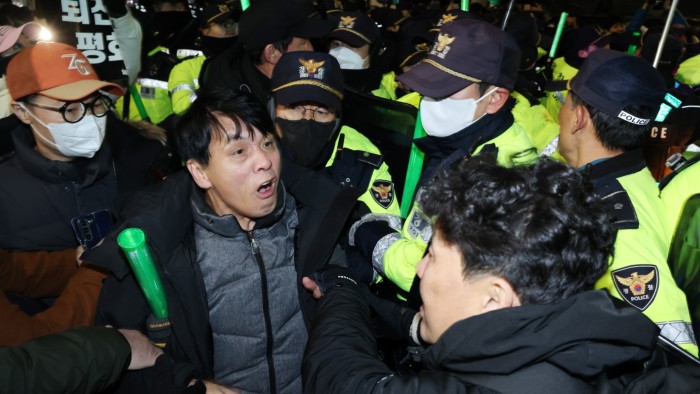South Korean President Yoon Suk Yeol has lifted his order to impose martial law, triggering calls for him to resign after a shortlived political gamble that sparked fierce opposition from the country’s lawmakers and alarmed international allies.
In a broadcast to the nation on Tuesday night, he justified the martial law order as being necessary to “eliminate anti-state forces as quickly as possible and normalise the country”.
But it was rejected unanimously by members of South Korea’s legislature.
Shortly before 4.30am on Wednesday, in his second televised address, Yoon said he would accept the National Assembly’s demand and lift the martial law through a cabinet meeting.
The climbdown, which analysts said left the president’s political future in serious jeopardy, came after Yoon’s plan was strongly criticised by lawmakers across the political spectrum.
The South Korean won strengthened as much as 1.4 per cent against the dollar after martial law was ended, following a sharp drop overnight.
The country’s main opposition Democratic party urged Yoon to step down immediately and vowed to push for his impeachment if he did not step aside.
“Yoon’s declaration of martial law is a grave violation of our constitution. This amounts to a clear act of treason and is a perfect reason to impeach him,” the party said in a statement on Wednesday.
More than 40 opposition lawmakers called on the National Assembly to launch impeachment proceedings against Yoon. “The president committed an act tantamount to treason by mobilising the military,” said Hwang Un-ha of the leftwing Rebuilding Korea party.
Critics of the martial law order included the leader of the president’s own conservative People Power party, Han Dong-hoon, a fellow former prosecutor once seen as Yoon’s political protégé. On Wednesday he urged Yoon to sack defence minister Kim Yong-hyun, who had proposed the declaration of martial law, and hold those involved responsible.
“President Yoon must explain this tragic situation thoroughly to the public,” Han said in a televised briefing. “I’ll do my best as the ruling party leader to minimise any economic and diplomatic damage.”
The Korean Confederation of Trade Unions, the country’s leading umbrella labour group, said it would launch an indefinite strike until Yoon stepped down.
Seeking to avert any market turmoil, South Korean officials on Wednesday announced plans for “unlimited” liquidity and the use of up to $35.4bn in stabilisation funds if needed to ensure normal market operations.
The country’s Kospi stock index declined as much as 2 per cent in the morning session on Wednesday. The South Korean won strengthened as much as 1.4 per cent against the dollar to Won1,408.63.
Yoon’s announcement of martial law was the first such decree in South Korea since a military coup in 1979.
In the US, Seoul’s leading military ally, deputy secretary of state Kurt Campbell said Washington was watching with “grave concern” and engaging with the South Korean government “at every level”.
A US National Security Council spokesperson said later: “We are relieved President Yoon has reversed course on his concerning declaration of martial law and respected the . . . National Assembly’s vote to end it.”
There had been chaotic scenes during the vote on Yoon’s martial law order in the opposition-controlled legislature, in which 190 out of 300 members participated.
With military helicopters circling overhead, soldiers sought to block large crowds of protesters from entering the parliament building.
The office of the National Assembly speaker later confirmed the troops had withdrawn from the building following the vote.
Yoon’s failed attempt to impose martial law follows simmering tensions between the president, whose approval ratings have plunged to record lows amid a slowing economy, and his rivals in parliament.
Yoon, a hardline former chief prosecutor, accused the leftwing majority in the National Assembly of plotting rebellion and harbouring North Korean sympathies.
Opposition leaders said they have been persecuted by prosecutors allied with the president.
They also said Yoon, who has praised South Korea’s past military leaders for their economic achievements, has revived the country’s authoritarian tradition.
Yoon described his opponents as North Korean “sympathisers” as he announced his martial law order banning “all political activities, including those of the National Assembly, local councils, political parties” and demonstrations.
Last week lawmakers voted to cut almost $3bn from Yoon’s proposed 2025 budget, slashing funding for the office of the president and senior prosecutors as well as for the police.
Claiming his hand had been forced by opposition attempts to impeach senior officials and prosecutors, Yoon said the cuts would turn South Korea into a “drug paradise” filled with “public order panic”.
His declaration of martial law was the first since the 1987 introduction of democracy in South Korea, which was ruled by rightwing military governments after the end of the Korean war in the 1950s.
But having withdrawn his decree, and with his political authority apparently in tatters, analysts questioned whether Yoon would be able to serve out his full five-year term as president, which expires in 2027.
Leif-Eric Easley, professor of international studies at Ewha Womans University in Seoul, said: “With extremely low public support and without strong backing within his own party and administration, the president should have known how difficult it would be to implement his late-night decree.
“He sounded like a politician under siege, making a desperate move against mounting scandals, institutional obstruction, and calls for impeachment, all of which are now likely to intensify.”
Additional reporting by Felicia Schwartz in Washington


